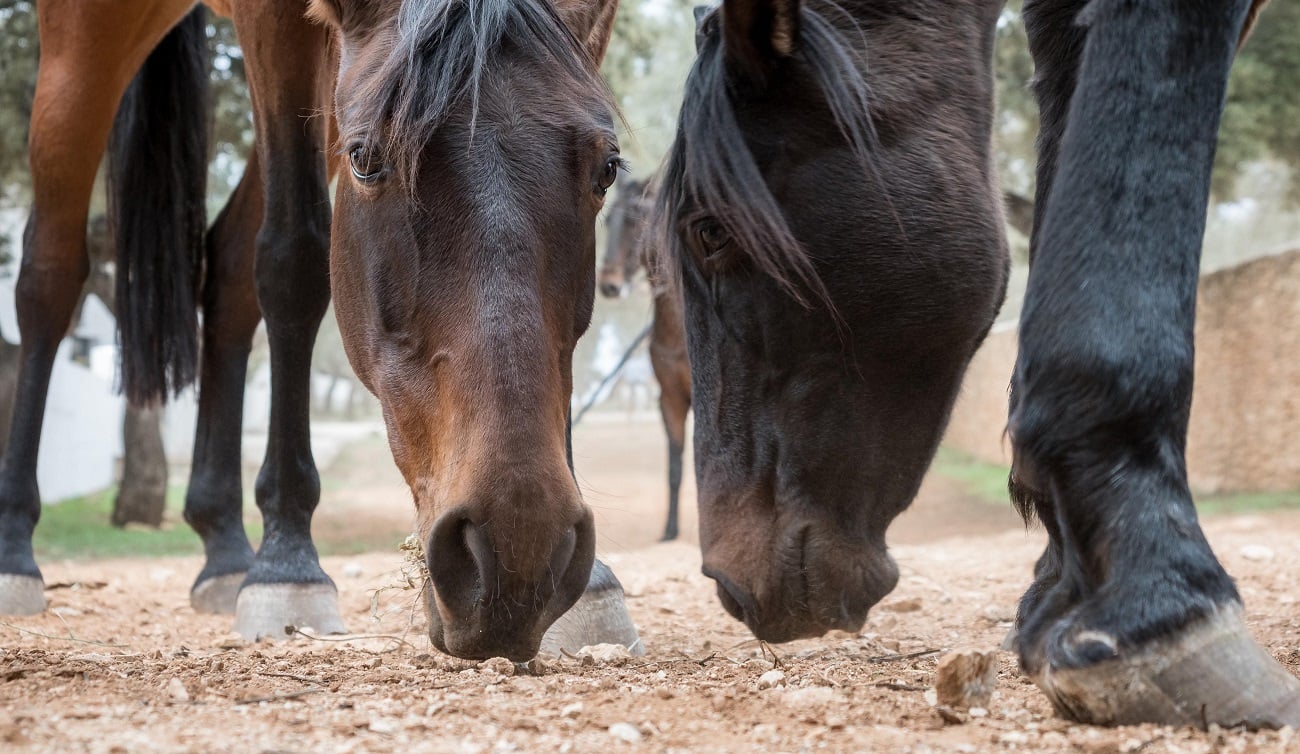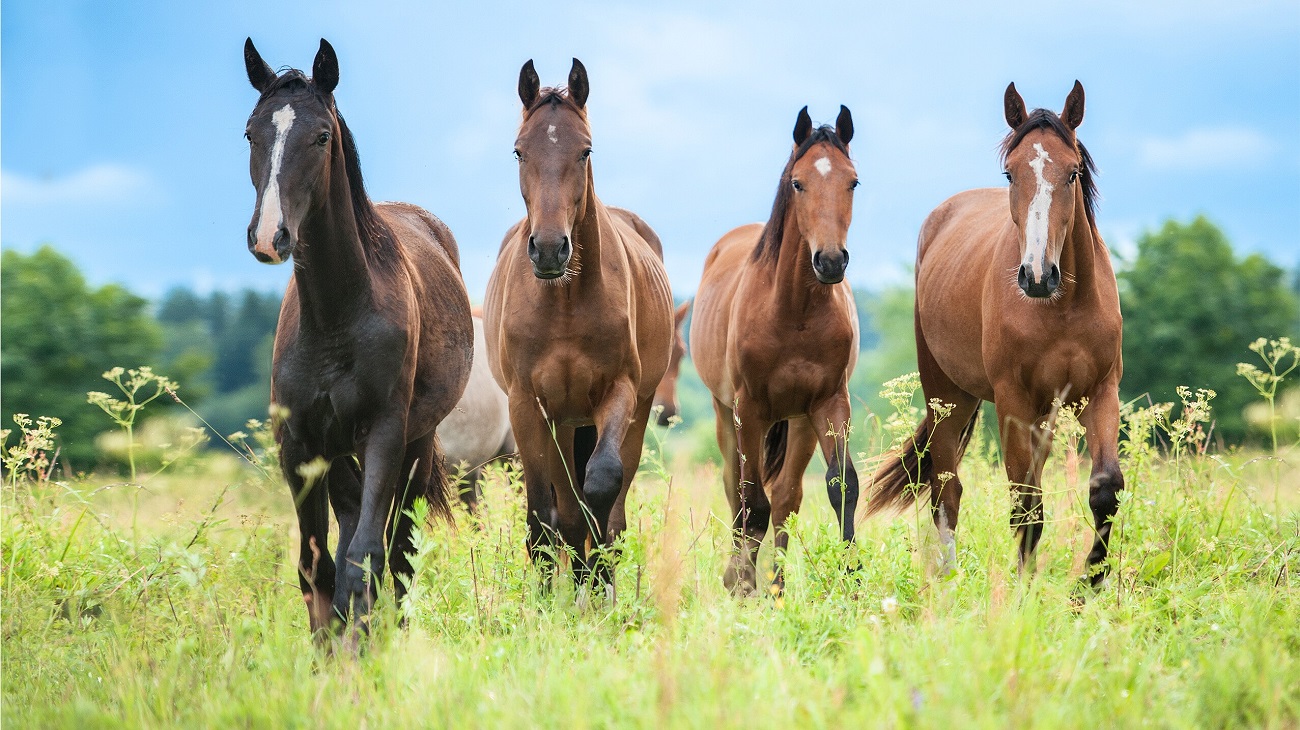The Happy Herbs: Chasteberry & Raspberry Leaves for Horses
May 06, 2025
Moody mares. Studdy geldings. Stallions with attitude. We know the barn drama all too well! Whether it’s heat cycles, hormonal highs and lows, or just general crankiness, when your horse is feeling off, it shows.
Chasteberry and raspberry leaf are two popular herbs known for their hormone-balancing properties. They can be an effective way to naturally support your horse’s mood and behavior while providing calming care you feel good about.
Let’s dig into why horses get temperamental—and how red raspberry leaf and chasteberry can help put both you and your horse in a better mood.
Why Do Mares (and Yes, Even Males) Get Moody?
Stress, environmental/management changes, or underlying health issues can all stir up irritability. There are many reasons why your horse might be feeling off—but hormone fluctuations are a common culprit.
Both mares and males can shift from sweet to spicy in no time, especially during breeding season or major life stages. Hormone-related behavior changes are most common in these horses:
- Mares during heat cycles or foaling season
- Geldings with lingering testosterone
- Stallions with high hormone levels
- Aging horses with endocrine imbalances (like Cushing’s)
Symptoms of Hormone Imbalance in Horses
When hormones are out of balance—or a mare’s in heat—horse behavior can get unpredictable, and even a little dangerous. Typical signs of hormone-related sourness include:
- Aggression/Irritability
- Ear-pinning
- Bucking, kicking or biting
- Stubbornness
- Girthiness
- Overexcitability
- Unfocused or unwilling behavior
Feel like your horse’s attitude is lining up with an imbalance or a seasonal shift? Let’s consider some natural support.
Two Powerful Herbs, One Happier Horse
Raspberry leaf and chasteberry herbs aren’t new to the hormone-balancing act. Both have been trusted and used in humans and horses for centuries. Let’s look at their effect on the equine body and how they aid hormone health and horse mood.
 What is Chasteberry?
What is Chasteberry?
Chasteberry (aka vitex agnus-castus) comes from the fruit of the chastetree shrub. It’s also known as “monk’s pepper” for its ancient reputation of calming sexual urges. Whether that’s your main goal for your horse or not, chasteberry packs some powerful benefits.
What Does Chasteberry Do for Horses?
Chasteberry supports the pituitary gland—the control center for hormone production. This can help regulate hormones that affect mood, behavior, and reproductive cycles.
Researchers in this study on chasteberry identified over 120 compounds that contribute to its bioactive effects. These include antinociceptive (pain signal blocking), anti-inflammatory, antioxidant, and anti-androgenic (testosterone-blocking) activities.
While it’s typically used to help moody mares become more manageable, it can also have a calming effect on aggressive stallions and geldings. Your horse may experience these benefits after a few weeks on chasteberry:
- Hormone balance: Helps regulate estrogen, progesterone, and testosterone, leveling out mood swings.
- Behavior support: Reduces irritability, aggression, stubbornness, or girthiness during heat cycles, and improves handling.
- Cushing’s/PPID support: This study of horses with Cushing’s disease reported improvements in energy levels, coat shedding, water balance, and laminitis symptoms.
Feeding Tips
Chasteberry is generally considered safe for long-term use. However, because of its affect on hormones, it’s typically not recommended for:
- Pregnant/lactating mares
- Growing horses
- Breeding stallions
As always, check with your vet before adding chasteberry to your horse’s routine—especially if they have Cushing’s. Chasteberry may help manage symptoms but isn’t necessarily a replacement for medications.
What are Red Raspberry Leaves?
Yes, red raspberry leaves (aka, rubus idaeus) come from the same plant you pluck sweet summer berries from. Dried raspberry leaf has been studied in humans—particularly during pregnancy—and it’s also a common supplement to support mare reproductive health during estrus and foaling.
Raspberry Leaf Benefits for Horses
Raspberry leaf is rich in fragrine. That’s an alkaloid that helps tone the uterus and smooth out hormone swings. While most research has been done on humans, horse owners also report great results. Here are potential benefits for your horse:
- Heat cycle support: Helps regulate heat cycles in mares, easing discomfort, inflammation, and mood swings.
- Foaling Aid: Tones the uterus, assists with contractions, and supports faster, healthy delivery.
- Natural calming: While most of the evidence comes from the barn, not a lab, word of mouth is raspberry leaf also promotes a calmer demeanor in geldings, stallions, and horses with anxiety or irritability.
Feeding Tips
Like chasteberry, raspberry leaf is generally safe—but you shouldn’t feed it during early pregnancy unless directed by your vet.
One Simple Supplement for Gut + Mood
At Redmond, we believe a healthy gut is the foundation of a happy horse. That’s why we created Daily Gold! It’s made from pure Redmond bentonite clay to buffer acid, soothe digestive discomfort, and support optimal gut performance. Now we’ve taken the good vibes up a notch with chasteberry and raspberry leaf to also provide hormone and mood balance all in one simple supplement.
 What to Love About Daily Gold Mood Support
What to Love About Daily Gold Mood Support
The symptoms and behaviors of hormone imbalance can be tricky—they often look a lot like those caused by poor equine gut health. Moodiness, irritability, or lack of focus might be chalked up to hormonal swings when they’re rooted in digestive issues, or vice versa.
Daily Gold Mood takes out the guesswork. It helps your horse feel better from the inside out—whether the root cause is digestive upset, hormonal shifts, or both. Here are the benefits it provides:
- Buffers stomach acid, helps prevent and relieve ulcers
- Binds and removes toxins
- Resolves diarrhea in horses
- Improves nutrient absorption and body condition
- Eases heat cycles, moodiness and stubborn behavior
- Supports hormone health in mares, geldings, and stallions
- May help manage PPID symptoms
- Relieves stress and promotes calm and focus

Always work with your vet or equine nutritionist before adding new supplements, especially if your horse is pregnant, breeding, or managing a medical condition.
With Daily Gold Mood Support, you can ease gut troubles and moody moments to help your horse feel—and act—like their best self again.
Learn More
- Is your horse stressed for reasons beyond hormonal changes? Get 10 pro tips to help your horse feel more calm.
- Just like us, horses get nervous during big events or changes. A trainer gives 7 ideas to help your horse relax.
© Redmond Equine 2025. All rights reserved.
Related posts

5 Reasons Horses Eat Dirt (and What to Do About It)
Sometimes I see my horse eating dirt. In moderation, dirt is beneficial for your horse. Here are 6 reasons why horses eat dirt, also known as...
December 18, 2024

When & How to Supplement Selenium for Horses
Discover the benefits of selenium for horses, a program to avoid both deficiency and toxicity in horses, and the best equine selenium supplement.



